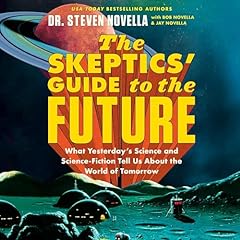
Hollyweird Science: The Next Generation
From Spaceships to Microchips
No se pudo agregar al carrito
Add to Cart failed.
Error al Agregar a Lista de Deseos.
Error al eliminar de la lista de deseos.
Error al añadir a tu biblioteca
Error al seguir el podcast
Error al dejar de seguir el podcast
 Exclusivo para miembros Prime: ¿Nuevo en Audible? Obtén 2 audiolibros gratis con tu prueba.
Exclusivo para miembros Prime: ¿Nuevo en Audible? Obtén 2 audiolibros gratis con tu prueba.Compra ahora por $24.88
-
Narrado por:
-
John Lescault
Informative, entertaining, and upbeat, this audiobook continues Grazier and Cass’ exploration of how technology, science, and scientists are portrayed in Hollywood productions. Both big and small-screen productions are featured and their science content illuminated - first by the authors and subsequently by a range of experts from science and the film world. Starring roles in this volume are played by, among other things, computers (human and mechanical), artificial intelligences, robots, and spacecraft. Interviews with writers, producers, and directors of acclaimed science-themed films stand side by side with the perspectives of scientists, science-fiction authors, and science advisors. The result is a stimulating and informative listening experience for the layperson and professional scientist or engineer alike.
The audiobook begins with a foreword by Zack Stentz, who cowrote X-Men: First Class and Thor and was a writer/producer on CW’s The Flash.
©2017 Springer International Publishing AG (P)2021 Blackstone PublishingLos oyentes también disfrutaron:




















First of all, no steel has is more than 2% carbon, as 2-4% carbon in iron makes cast iron. And beyond 4% exceeds the interstitial solubility limit of carbon in iron. Second, steel is only considered “stainless steel” when it contains at least 12% chromium. Thus the composition they claim is not only ridiculous, but thermodynamically impossible.
Otherwise, the book does a pretty interesting dive into astrophysics. It’s kind of heavy on the equations if you don’t have the reference material they refer to
Decent science survey, but
Se ha producido un error. Vuelve a intentarlo dentro de unos minutos.
Add to this the really strange intonation and tempo of the narrator, which at times sounds like text to speech, and despite the fascinating content, this just doesn’t make for a particularly good audio book.
Rather pick this up on paper or ebook
Se ha producido un error. Vuelve a intentarlo dentro de unos minutos.


